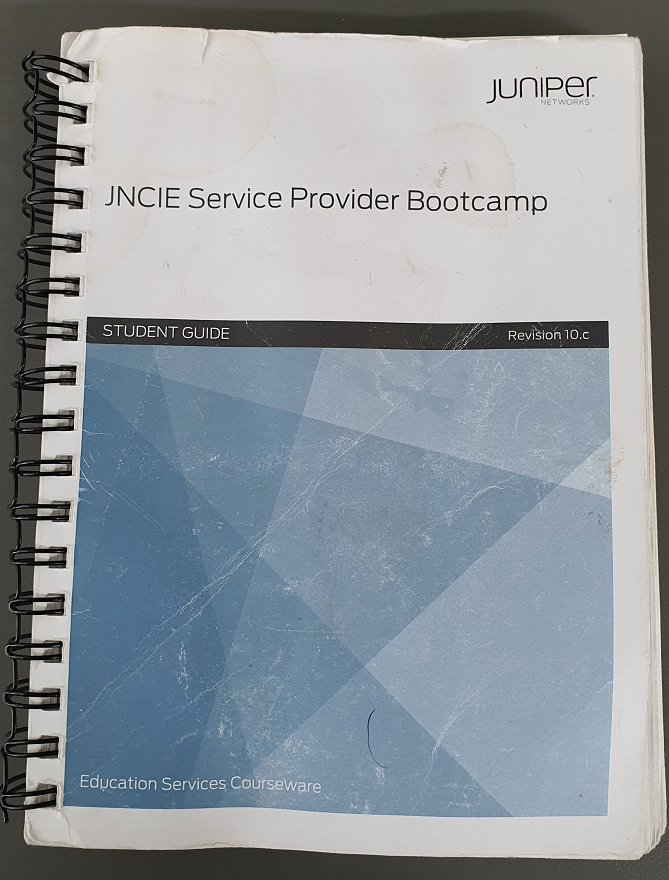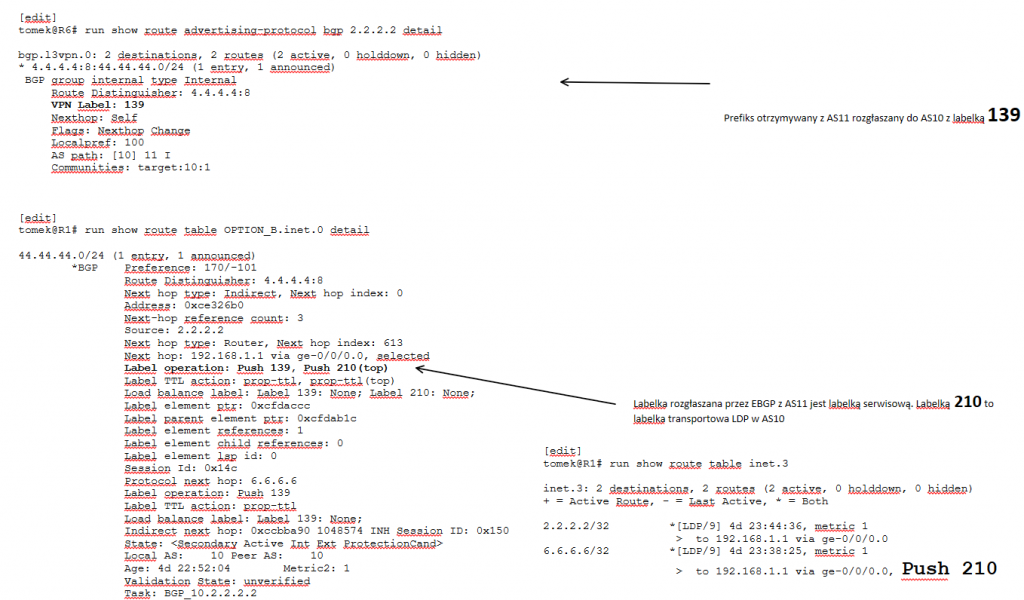It has been a full year since my last post about my JNCIE journey. A lot has happened. I had to cancel my scheduled exam due to covid-19 situation and I had some ups and downs once in a while. But for this entire time I tried to stay positive and focus on studying. It is difficult with a small child, but every time I had some extra free time I tried to lab or read the documentation for the topics that I was learning.
This is the second post about my JNCIE-SP preparations. As I’m studying for this exam, I want to share my experience with you, show you what materials and tools I use to study and familiarise you with my methodology. Maybe someone will find my tips useful as they are studying and struggling as I am.
My study plan during the last year was more or less the same for the entire time. From Monday till Friday I had 2 to 3 hours of time for study, mainly in the evenings. Sometimes more, sometimes less. Of course there were exceptions from that rule, but most of the time I stuck to the plan. So during a week I have had approximately 10 to 15 hours for studying. Sometimes I could study during my work hours when I had nothing to do, other times I had not studied the entire days due to normal, everyday tasks and responsibilities. There was a time when I had loosen my strict schedule and studied only one or two days a week. But most of the time I had kept it tight. Weekends on the other hand were reserved either for family time or my pleasure of gaming :). Hey, you have to reset your brain sometimes, right? Unfortunately, I’m not in a position where I have an entire day to spare for study either on weekdays or during weekends, so, as you can tell, my time is very limited.
As you can probably imagine, when you take into account the amount of study hours per week, refreshing, learning and labbing all the topics for such a huge exam can take a looooong time. That is why it took me almost an entire year. And after this time there are still some topics I don’t feel confident with, such as Multicast or Class of Service. Also, with such a schedule there is a problem with forgetting the things that you learned at the beginning. Is very frustrating. But every time I had this feeling of frustration, I repeated to myself the wise words that someone once told me: ”Hey, it’s not a sprint, it’s a marathon. Trust me, it’s worth it” – thanks Chris.
So, with that in mind, I kept going. After this year I went through the following materials (in that particular order):
The theory
IPv6
- Day ONE – Exploring IPv6
- Day ONE – Advanced IPv6 Config
IS-IS
- Introduction
- Multilevel Networks
- Advanced Operations
Routing in General
- Advanced Junos Service Provider Routing – official Juniper materials. There is Protocol Independent routing, OSPF, IS-IS, BGP and many other useful things. This one I went through very thoroughly.
- Junos Enterprise Routing – mainly for class of service and multicast topics
VPN’s
- MPLS VPNs – official Juniper course materials (3 part book) – this one I refreshed for certain topics – went through very thoroughly as well. Trust me it takes a lot of time to read and lab all of this.
- This Week – Deploying MPLS – just to refresh and summarise some of the nuances.
CoS
- Day ONE – Deploying Basic QoS
- Juniper COS Guide
- My all time favorite – Junos Enterprise Routing – Cos section
Multicast and NG-MVPN
- MPLS VPNs – official Juniper course materials (3 part book)
- Junos Enterprise Routing – Multicast section
- Some of the blog post by Chris Parker from https://www.networkfuntimes.com/ – great read. I highly recommend it.
- Some of the junos documentation
The practice.
During the theory study I tried to lab as much as I could to implement the knowledge, and tried to do fun and unexpected things with it. So after each topic I tried to configure basic functionality and then I have done the:
- iNET ZERO’s Tech Focus labs
And oh boy it was a crushing experience. Not only have those labs brought me back to earth but also destroyed a confidence in my ability to execute the knowledge that I have just learned. At first I couldn’t accept it, but after a while I came to a point where I appreciated it since it showed me a lot of very interesting functionalities, so I started digging around them. I printed the tasks from the Tech Lab book only and at each point when I discovered something interesting I made a note next to it.
Also, it’s worth mentioning that for each topic I made extensive amounts of notes regarding every nuance and functionality. I find it very useful when I hand write my thoughts on certain things and explain it in my own words in my native language. The knowledge stays with me longer that way. Of course the notes are far from perfect but I noticed that I am doing better over time :).

I have also discovered Microsoft’s ONE NOTE which is brilliant for electronic notes where I can paste my configuration, do some topology pictures and so on. For this reason, maybe half the way I have also started using One Note to preserve some of the configuration schemes for certain topics
My lab
My work lab consists of several servers with virtualisation, so I’ve been lucky enough to use that as my lab. I have 8 instances of vMX deployed on one of the hosts and interconnected internally. I know it’s a little bit overkill and you can use something like GNS3 or EVE-NG or even one of the smallest SRX’s like 210 (with 210 not every hw revision supports LS’s), and use logical-systems on that, but I wanted to have a full set of features available.
After each topic I saved the config file from every router for future reference.
What Next
Currently I’m at the point where I worked on every major topic from the exam curriculum. Of course I’m far from being confident in my abilities, but that’s what the repetition phase is for, right? So, I’m going to repeat and rework some of the topics, then I will try to do the following:
- iNET ZERO’s Lab Preparation Workbook, as well as
- iNET ZERO’s Full Day Lab Challenges (Full Scale Lab workbook)
I have a lot to do ahead of me but I try to stay positive and just keep going :). Also I’ve been able to borrow the:
- JNCIE-SP Bootcamp Student Guide
from one of my colleagues who tried to pass this exam a few years ago. I hope to find some additional tips that I could have missed during the theory repetition.

So, some finishing words for this post, which turned out a little longer than I expected. I will try to schedule my first attempt till the end of 2020 (hopefully in November), so that I could have a chance for the second attempt still this year. From the beginning of 2021 there will be a new version of this exam which has EVPN. I am familiar with this protocol but I would have to lab it from the beginning and quite extensively. Of course all is not lost yet, since the majority of the curriculum of the new exam stays the same. I will try to do another post after or just before the exam to share my experience. Wish me luck 🙂
[UPDATE]
I wrote this post at the beginning of October but didn’t have time to post it. Since October a lot things have changed. Firstly, my on site exam (JPR-960) that I had scheduled for November 13th was canceled due to covid situation in Netherlands. So I cancelled it since it require me to sit down and lab also the EVPN topic. Then I needed to refresh my JNCIP-SP exam and since those theoretical exams are sometimes tricky I refreshed all the theoretical nuances for it. It took me also several days worth of study. After successful JNCIP-SP refresh attempt, now I’m doing the iNET ZERO’s Lab Preparation Workbook chapters – and I must admit that is going smoothly 🙂 and I’m very happy with that. Next post will be about my first exam attempt experience. Stay tuned !!! 🙂

